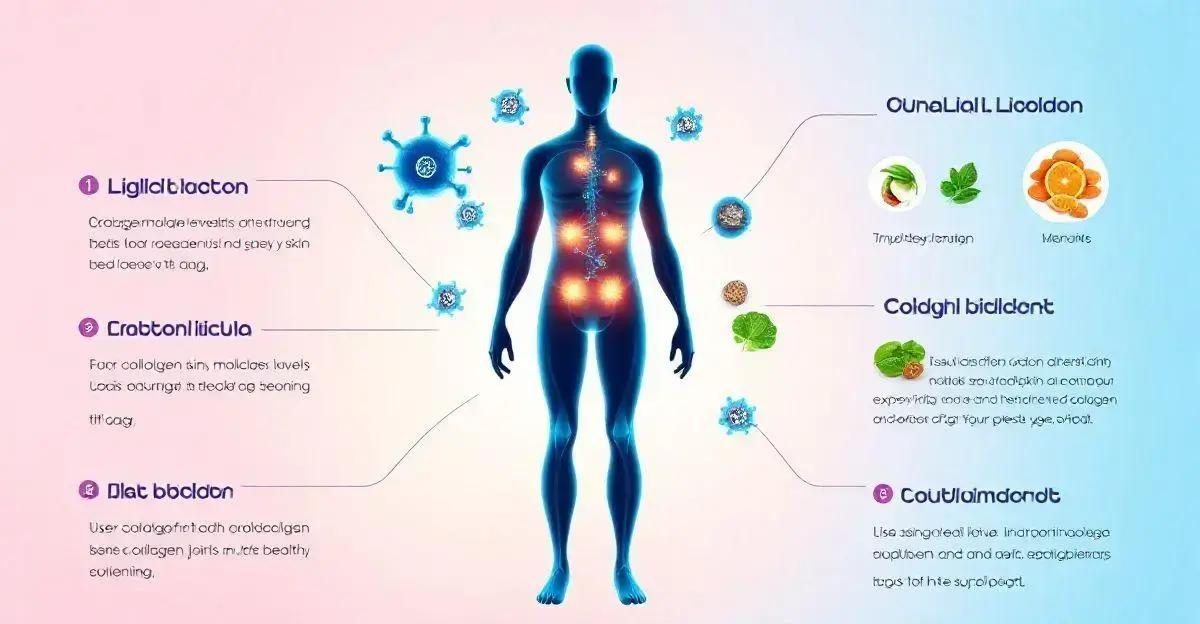Collagen is vital for skin elasticity and joint health, but its production declines from the mid-20s, leading to signs of aging like wrinkles and joint pain. To support collagen levels, incorporate collagen-rich foods such as bone broth and fish, and maintain a healthy lifestyle with hydration and sun protection. While direct testing for collagen isn’t common, skin elasticity tests can offer insights into your collagen health, helping you promote a youthful appearance and overall well-being.
Collagen levels play a critical role in your overall health and skin appearance. As the most abundant protein in the body, collagen is vital for maintaining skin elasticity, joint health, and more. In this article, we’ll dive into what collagen levels are, how they change over time, and how to maintain optimal levels for a healthier you.
What Are Collagen Levels?
Collagen levels refer to the concentration of collagen protein present in the body, which is essential for maintaining the structure and integrity of various tissues, including skin, bones, and joints. Collagen is the most abundant protein in the human body, accounting for about 30% of the total protein content. It acts as a framework for your skin, providing strength and elasticity, while also supporting the health of bones, cartilage, and muscles.
Collagen is made up of amino acids, particularly glycine, proline, and hydroxyproline. These amino acids are crucial for the formation of collagen fibers, which give tissues their strength and resilience. There are several types of collagen, with Type I being the most prevalent in skin, tendons, and bones, and Type II being mainly found in cartilage.
As we age, our body’s natural collagen production declines, typically starting in our mid-20s. This decrease can lead to various signs of aging, such as wrinkles, sagging skin, and joint pain. Therefore, understanding collagen levels is crucial for recognizing how they impact our overall health and appearance.
Monitoring and maintaining healthy collagen levels can significantly contribute to skin vitality and joint health, making it an important focus for those looking to improve their physical well-being and aesthetics.

How Collagen Levels Change with Age
As we age, collagen levels naturally decline, leading to a variety of physical changes in the body. This process typically begins in our mid-20s and gradually accelerates, impacting skin, joints, and overall health. Here’s how collagen levels change with age:
- Declining Production: Starting in our mid-20s, collagen production decreases by about 1% each year. This gradual decline means that by the time we reach our 40s and 50s, we have significantly less collagen than we did in our youth.
- Visible Signs of Aging: The most noticeable effects of reduced collagen levels are seen in the skin. As collagen decreases, skin loses its elasticity and firmness, leading to wrinkles, sagging, and a rough texture. Fine lines around the eyes and mouth may become more prominent, and skin may appear drier and less radiant.
- Joint Health Implications: Collagen is essential for maintaining the integrity of cartilage, the tissue that cushions joints. As collagen levels drop, joint pain and stiffness can increase, leading to conditions such as osteoarthritis, which is characterized by the degeneration of joint cartilage.
- Bone Density Changes: Collagen also plays a vital role in bone structure. With age, decreased collagen levels can contribute to reduced bone density, increasing the risk of fractures and osteoporosis, especially in postmenopausal women.
- Impact on Hair and Nails: Lower collagen levels can affect hair and nail health as well. Hair may become thinner and more brittle, while nails can become weaker and more prone to breakage.
- Influence of Lifestyle Factors: While aging is a natural process, various lifestyle factors can exacerbate the decline in collagen levels. Sun exposure, smoking, excessive alcohol consumption, poor diet, and lack of hydration can all accelerate collagen loss and lead to earlier signs of aging.
Understanding how collagen levels change with age underscores the importance of proactive measures to maintain skin and joint health. By adopting healthy lifestyle choices and incorporating collagen-rich foods and supplements, individuals can help mitigate the effects of aging on collagen levels.
Signs of Decreasing Collagen Levels
As collagen levels decline, the body exhibits several telltale signs that can indicate a decrease in this essential protein. Recognizing these signs can help you take proactive steps to maintain your collagen levels. Here are some common signs of decreasing collagen levels:
- Wrinkles and Fine Lines: One of the most noticeable signs of reduced collagen is the appearance of wrinkles and fine lines, particularly around the eyes, mouth, and forehead. These lines can deepen over time, contributing to an aged appearance.
- Sagging Skin: As collagen provides structure and firmness to the skin, a decrease can lead to sagging, especially along the jawline and cheeks. Loss of volume in these areas can create a less youthful appearance.
- Dry and Dull Skin: Collagen helps maintain skin hydration and elasticity. When collagen levels drop, skin may become dry, flaky, and lackluster, losing its natural glow.
- Joint Pain and Stiffness: Decreased collagen levels can affect the cartilage that cushions joints, leading to pain, stiffness, and swelling. This is particularly common in individuals with osteoarthritis, where joint cartilage wears down over time.
- Weaker Hair and Nails: Collagen contributes to the strength and health of hair and nails. A noticeable decline in collagen levels can result in thinner, brittle hair and nails that are more prone to breakage.
- Increased Fragility of Blood Vessels: Collagen is essential for the structure of blood vessels. Decreasing levels can lead to fragile blood vessels, resulting in easy bruising and a tendency for varicose veins.
- Slow Wound Healing: Collagen plays a crucial role in the healing process. If you notice that cuts or injuries take longer to heal, it may be a sign of declining collagen levels.
Being aware of these signs can empower you to take action early on. By implementing dietary changes, lifestyle modifications, and possibly collagen supplements, you can work towards maintaining or enhancing your collagen levels, supporting overall skin and joint health.

Foods That Boost Collagen Levels
Incorporating specific foods into your diet can significantly enhance your body’s collagen production. Here are some of the best foods that boost collagen levels:
- Bone Broth: Made by simmering animal bones and connective tissues, bone broth is rich in collagen and other beneficial nutrients. It’s an excellent addition to soups, stews, or even consumed on its own.
- Fish and Shellfish: Fish, particularly those with skin like salmon, mackerel, and sardines, are high in collagen. Shellfish such as shrimp and crab also contain collagen-enhancing amino acids, making them a great option for boosting levels.
- Poultry: Chicken and turkey are not only excellent sources of protein but also contain connective tissues that provide collagen. Incorporating chicken broth or roasted poultry into your meals can enhance your collagen intake.
- Eggs: Egg whites are rich in proline, an amino acid essential for collagen production. Including eggs in your diet can help support your body’s collagen synthesis.
- Leafy Greens: Vegetables like spinach, kale, and Swiss chard are packed with vitamins and minerals that aid in collagen production. Their high antioxidant content also helps protect existing collagen from damage.
- Berries: Berries, such as strawberries, blueberries, and raspberries, are rich in vitamin C, which is crucial for collagen synthesis. They also provide antioxidants that combat skin aging.
- Nuts and Seeds: Nuts like almonds and walnuts, along with seeds such as chia and flaxseeds, are good sources of healthy fats and nutrients that support collagen production.
- Garlic: Garlic contains sulfur, which helps prevent the breakdown of collagen in the body. Adding garlic to your meals can support collagen levels and overall health.
- Beans and Legumes: Beans and legumes are rich in protein and essential amino acids, making them a great plant-based option for boosting collagen levels.
Incorporating these collagen-boosting foods into your diet can help ensure that your body has the necessary building blocks for producing collagen, promoting healthier skin, joints, and overall well-being.
The Impact of Lifestyle on Collagen Production
Your lifestyle choices play a significant role in influencing collagen production and maintaining healthy levels of this vital protein. Here are some key lifestyle factors that can impact collagen synthesis:
- Diet: A nutrient-rich diet is essential for collagen production. Consuming foods high in protein, vitamin C, and antioxidants supports the body’s natural collagen synthesis. Conversely, a diet high in sugar and processed foods can lead to collagen breakdown.
- Hydration: Staying well-hydrated is crucial for maintaining skin elasticity and overall health. Dehydration can lead to dry, dull skin and hinder collagen production. Aim to drink plenty of water throughout the day to support your skin’s hydration needs.
- Sun Protection: UV exposure can significantly damage collagen fibers, leading to premature aging and a decrease in collagen levels. Using sunscreen, wearing protective clothing, and seeking shade can help protect your skin from harmful UV rays and preserve collagen.
- Smoking: Smoking is detrimental to collagen levels, as it reduces blood flow and deprives the skin of oxygen and nutrients. The toxins in cigarette smoke can accelerate skin aging and lead to a noticeable decline in collagen production.
- Alcohol Consumption: Excessive alcohol intake can lead to dehydration and negatively impact the skin’s health. It can also inhibit collagen production and increase the risk of skin damage and aging.
- Physical Activity: Regular exercise promotes healthy blood circulation, which helps deliver nutrients to the skin and supports collagen synthesis. Engaging in physical activity can also reduce stress and improve overall well-being.
- Sleep Quality: Adequate sleep is essential for cellular repair and regeneration, including skin health and collagen production. Aim for 7-9 hours of quality sleep each night to support your body’s natural processes.
- Stress Management: Chronic stress can lead to hormonal imbalances that negatively affect collagen production. Incorporating stress-reducing practices such as yoga, meditation, or mindfulness can help maintain healthy collagen levels.
By making conscious lifestyle choices, you can positively impact your collagen production and overall skin health. A balanced diet, hydration, sun protection, and healthy habits can go a long way in preserving your body’s collagen levels and promoting a youthful appearance.

How to Test Your Collagen Levels
Understanding your collagen levels can help you take proactive steps to maintain skin health and overall well-being. While there is no direct, at-home test for measuring collagen levels, there are several methods and indicators that can help assess your collagen status:
- Skin Elasticity Test: One simple way to gauge collagen levels is by testing your skin’s elasticity. Pinch the skin on the back of your hand or forearm and release. If your skin bounces back quickly, it indicates good elasticity, which is associated with higher collagen levels. Slower rebound may suggest a decline in collagen.
- Professional Skin Analysis: Dermatologists often use advanced imaging techniques to analyze skin health, including collagen density and structure. A professional skin analysis can provide valuable insights into your collagen levels and overall skin condition.
- Blood Tests: Some healthcare providers can use blood tests to measure specific biomarkers associated with collagen turnover. These tests can indicate the rate at which your body is producing and breaking down collagen, although they are typically conducted in a clinical setting.
- Observing Skin Changes: Keep an eye on visible signs of aging, such as wrinkles, sagging, and dryness. If you notice an increase in these signs, it may indicate a decrease in collagen levels. Tracking changes over time can provide insights into your collagen status.
- Joint Health Assessment: If you experience joint pain, stiffness, or decreased mobility, these may be signs of reduced collagen levels affecting your cartilage. Consulting with a healthcare professional can help determine if collagen depletion is contributing to joint issues.
- Consulting a Nutritionist or Healthcare Provider: If you suspect low collagen levels, discussing your concerns with a nutritionist or healthcare provider can help. They can evaluate your diet, lifestyle, and overall health, and recommend tests or dietary changes to improve collagen production.
While direct testing of collagen levels may not be readily available, these methods can help you assess your collagen status and take appropriate actions to support healthy levels. Early detection and preventive measures can lead to better skin and joint health.
Conclusion
Understanding collagen levels is essential for maintaining youthful skin, healthy joints, and overall well-being.
As we age, collagen production naturally declines, leading to visible signs of aging and potential health issues. By recognizing the signs of decreasing collagen levels and implementing dietary changes, lifestyle modifications, and protective measures, you can support your body’s collagen synthesis.
Incorporating collagen-rich foods, staying hydrated, protecting your skin from UV damage, and managing stress are effective strategies for maintaining optimal collagen levels.
Additionally, monitoring skin elasticity and consulting with healthcare professionals can provide valuable insights into your collagen status.
By taking proactive steps to support your collagen levels, you can enhance your appearance and health, ensuring a vibrant and youthful quality of life for years to come.
FAQ – Frequently Asked Questions about Collagen Levels
What are collagen levels?
Collagen levels refer to the concentration of collagen protein in the body, which is essential for maintaining skin elasticity, joint health, and overall structure.
How do collagen levels change with age?
Collagen production typically starts to decline in the mid-20s at a rate of about 1% per year, leading to signs of aging such as wrinkles and joint pain.
What are the signs of decreasing collagen levels?
Common signs include wrinkles, sagging skin, dry skin, joint pain, and weaker hair and nails.
What foods can boost collagen levels?
Foods like bone broth, fish, poultry, eggs, leafy greens, berries, nuts, and seeds are known to support collagen production.
How can lifestyle choices impact collagen production?
Diet, hydration, sun protection, smoking, alcohol consumption, exercise, sleep quality, and stress management all play significant roles in collagen production.
How can I test my collagen levels?
While there is no direct home test, you can assess collagen levels through skin elasticity tests, professional skin analyses, and observing changes in skin and joint health.


